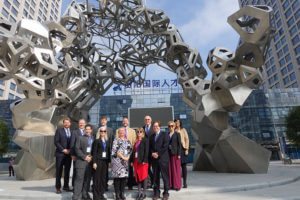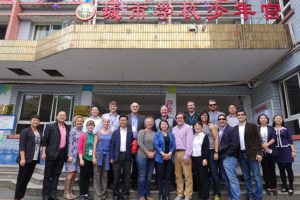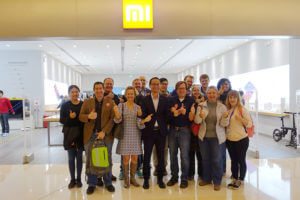
In late October, as a member of Voices for Innovation, I had a once-in-a-lifetime opportunity to participate in a Microsoft-supported week-long “Golden Key Project” workshop in China.
Organized by the Chinese People’s Association for Friendship with Foreign Countries, this exchange program enabled our delegation of U.S. technology leaders, policy experts, and one academic to see firsthand how China’s public and private sectors are supporting tech education, innovation, and entrepreneurship.
It was an eye-opening experience that showed how China is competing, partnering with multinational companies, and laying a strong foundation for future innovation and economic growth.
A Focus on Two Regional Cities
After two days of meetings and presentations in Beijing, our delegation flew to the city of Guiyang, in the southwest province of Guizhou. By Chinese standards, Guiyang is a smaller, regional “Tier 3” city, but it still has an area population exceeding 4 million people.
Under Beijing-led planning, Guiyang has become an important data center hub, and the area is attracting private and public sector investments in big data development and innovation. We toured the city’s big data application demo center and heard from local business and government leaders.

The next day, we traveled by bus to another city, Zunyi, which is about 90 miles north of Guiyang. China is working to attract investments to its smaller cities, and Microsoft is supporting an innovation center in Zunyi.
We visited a grade school in Zunyi, and VFI’s Jonathan Friebert led an Hour of Code session with students. China, we learned, is emphasizing both English language learning and computer literacy in its schools. It was a reminder that the U.S. hasn’t made technology a priority in our own K-12 schools.

Tech Incubation in Beijing
The next day, we returned to Beijing. We got to do some sightseeing, including a visit to the Great Wall. We then visited China’s answer to Silicon Valley, Zhongguancun Innovation Way, also known as “Inno Way.”

Inno Way includes some 40 tech incubators, many of which are located in buildings anchored by cafes. Hundreds of tech startups are being incubated here, with billions of dollars flowing through the district. While the incubation ecosystem aims in part to mirror the startup environment we see in the U.S., it is strongly supported by the Chinese government.
In fact, one of the key takeaways from the trip was to see how much cultural, financial, and government support drives innovation and entrepreneurship in China. In the U.S., the business and tech communities would not welcome a top-down government approach to guiding innovation and business practices.
On the other hand, it is arguable that stronger government commitments to tech education, scientific research, and policies that promote startups would be welcome. China is clearly borrowing from the U.S.’s innovation playbook, but our country has opportunities to learn from China as well.

